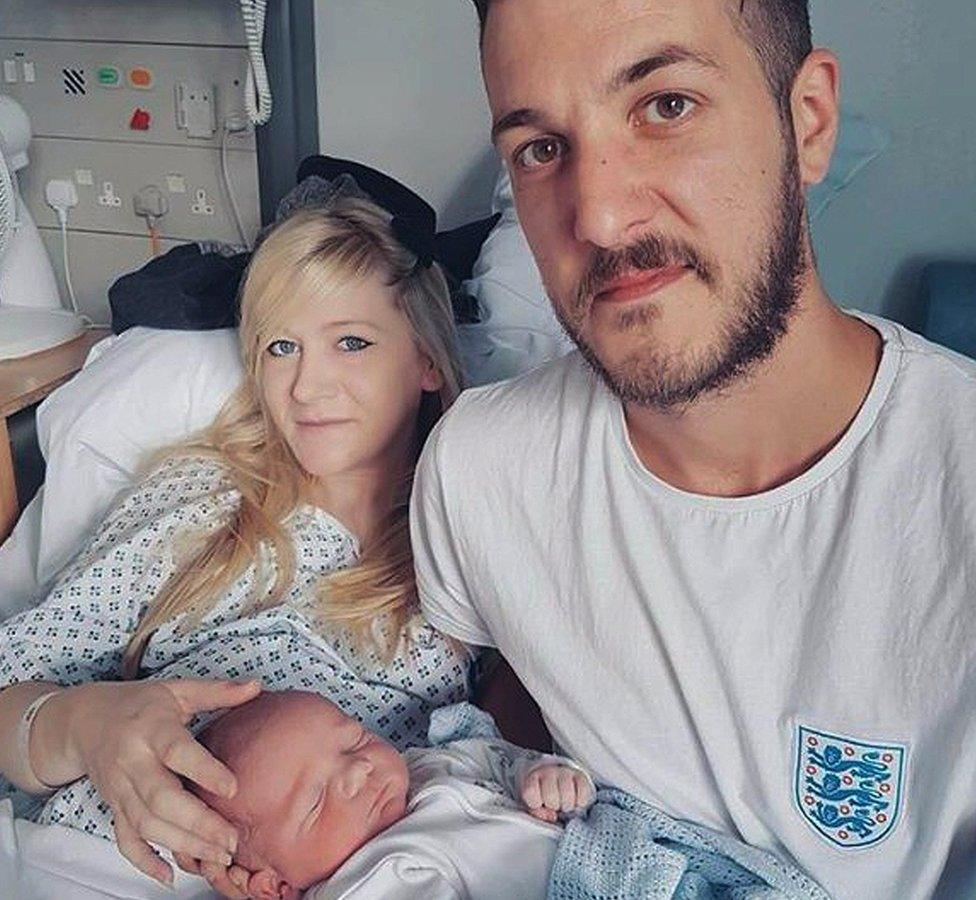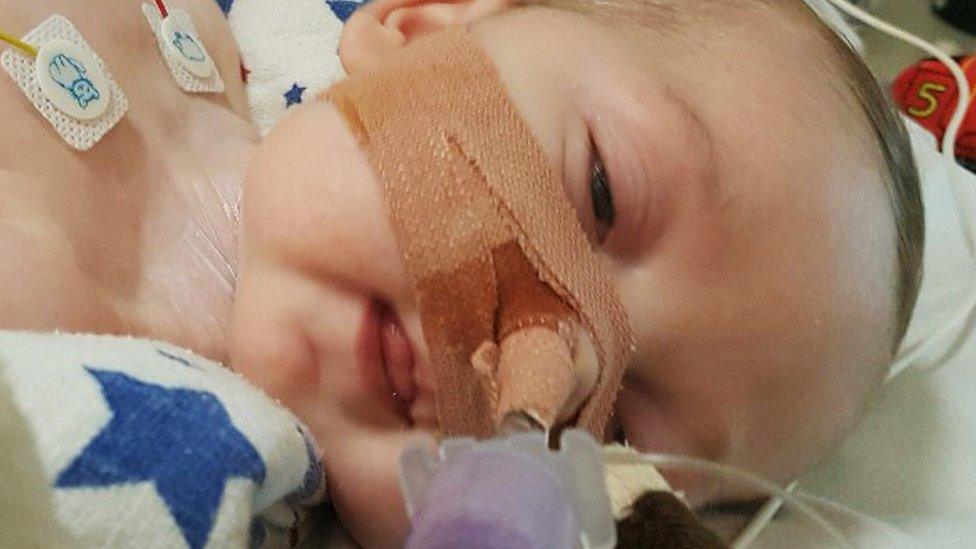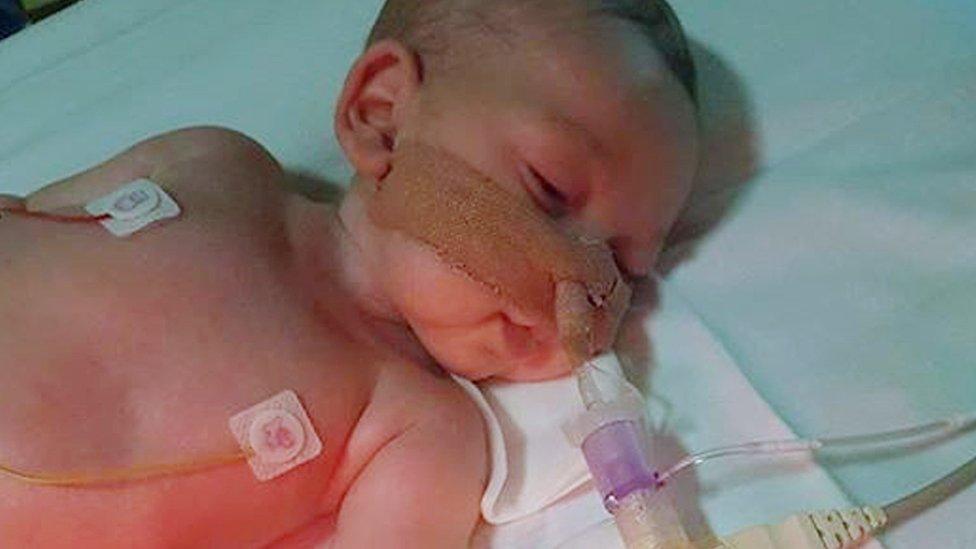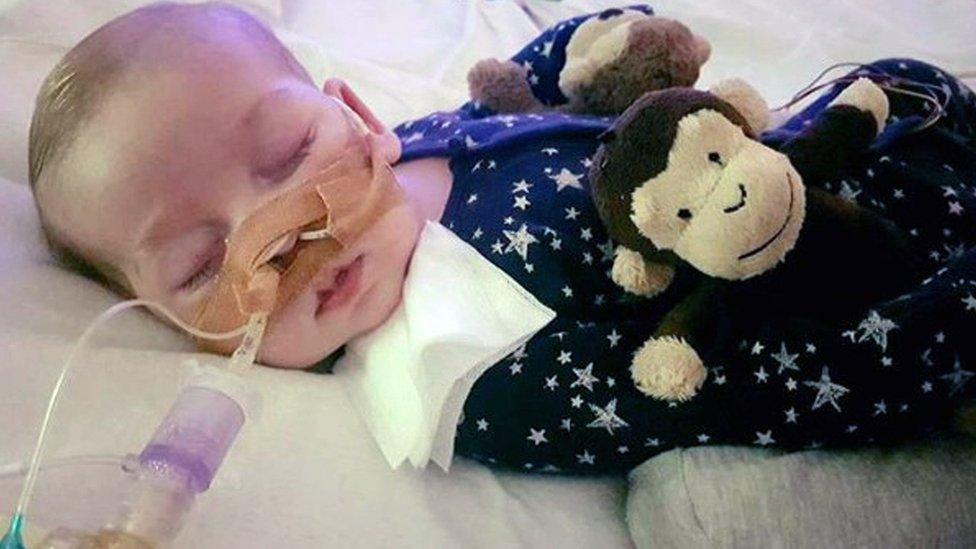Charlie Gard: Parents ask judge to 'give him a chance'
- Published

Charlie's rare disease has left him unable to cry and made him deaf, the High Court heard
A couple who want to take their sick baby to a US hospital for treatment have asked a High Court judge to "please give him a chance".
A decision over whether to turn off Charlie Gard's life support machines is being considered by the judge.
Doctors say the eight-month-old, who suffers from a rare genetic condition and has brain damage, should move to a palliative care regime.
Connie Yates and Chris Gard disagree and want to take him to the US.
Mr Gard said: "My son is the apple of my eye and I would do anything for him and I want to give him a chance.
"It doesn't mean he should have to die because he will not be like another little boy running around."

Connie Yates and Chris Gard with their son Charlie, who was born healthy in August last year
Miss Yates told the judge: "I don't see the rush to end it now."
She added: "I don't think he is suffering or I wouldn't be here."
'Impossible situation'
Judge Mr Justice Francis is analysing evidence at a hearing which began on Monday.
He has been told Charlie, who was born on 4 August 2016, has a disorder called mitochondrial depletion syndrome which causes progressive muscle weakness.
The judge told the court as the hearing resumed on Wednesday: "I do fully understand that the parents are in an almost impossible situation."
Doctors at London's Great Ormond Street Hospital said the baby receives 24-hour care and should be allowed to die with dignity.

Analysis by Jane Dreaper, BBC News health correspondent
Baby Charlie suffers from an incredibly rare and devastating disease affecting the genetic building blocks which give energy to cells
The Family Division of the High Court has heard how this mutation in the RRM2B gene generally proves fatal in the first year of life, although children can survive for longer on ventilators.
The American doctor who proposes treating Charlie for up to six months has stressed that an experimental drug, called nucleoside therapy, is not a cure.
Such a treatment plan would also require detailed conversations with intensive care specialists about ensuring the baby was medically stable for the long trip to the United States.
Doctors at Great Ormond Street Hospital in London say Charlie could theoretically have been given the treatment here - but they do not believe this is appropriate because he is so ill.

An intensive care specialist said Charlie was no longer responsive and it was hard to be sure whether little boy was in pain.
"Charlie has deteriorated hugely since he first came to us," he said.
"The disease has affected his brain to the extent that he is completely ventilator-dependent."
The specialist told the judge there was a small chance treatment would work, but even if it did Charlie's life could not be made "tolerable".
He said: "It is really hard to see how he could possibly benefit."

Charlie's parents hope to take him to the US for pioneering treatment
The specialist said of Charlie's illness: "It is not just irreversible, it is progressive."
The couple, who live in London, believe Charlie may have a chance of surviving if he receives treatment abroad.
A crowdfunding campaign for the trip is about £50,000 short of its £1.3m target.
Their efforts to find treatment were described as a "spanner in the works" in an email written by a doctor.
When questioned about the phrase by barrister Sophia Roper, the specialist told the court it was "a bit clumsy".

Specialists at Great Ormond Street say there is no accepted cure for Charlie's rare disease
Victoria Butler-Cole, who is representing Charlie's interests via a guardian, said negotiations between doctors and the couple had not been fruitful.
She told the judge Mr Gard and Miss Yates had been willing to "consider some middle ground" but they could not reach agreement with hospital bosses.
The hearing continues.
- Published3 April 2017

- Published2 April 2017

- Published7 March 2017

- Published3 March 2017
